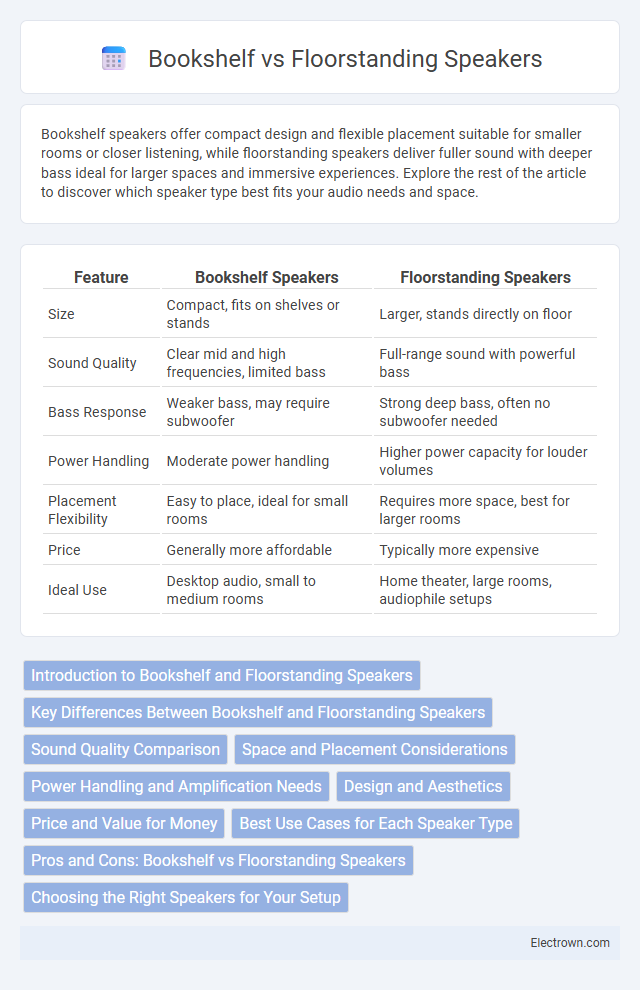Bookshelf speakers offer compact design and flexible placement suitable for smaller rooms or closer listening, while floorstanding speakers deliver fuller sound with deeper bass ideal for larger spaces and immersive experiences. Explore the rest of the article to discover which speaker type best fits your audio needs and space.
Table of Comparison
| Feature | Bookshelf Speakers | Floorstanding Speakers |
|---|---|---|
| Size | Compact, fits on shelves or stands | Larger, stands directly on floor |
| Sound Quality | Clear mid and high frequencies, limited bass | Full-range sound with powerful bass |
| Bass Response | Weaker bass, may require subwoofer | Strong deep bass, often no subwoofer needed |
| Power Handling | Moderate power handling | Higher power capacity for louder volumes |
| Placement Flexibility | Easy to place, ideal for small rooms | Requires more space, best for larger rooms |
| Price | Generally more affordable | Typically more expensive |
| Ideal Use | Desktop audio, small to medium rooms | Home theater, large rooms, audiophile setups |
Introduction to Bookshelf and Floorstanding Speakers
Bookshelf speakers are compact audio devices designed to fit on shelves or stands, offering clear sound ideal for smaller rooms or close listening. Floorstanding speakers are larger and built to stand directly on the floor, delivering powerful, full-range sound with enhanced bass for spacious environments. Choosing the right option depends on your room size, listening preferences, and space availability.
Key Differences Between Bookshelf and Floorstanding Speakers
Bookshelf speakers are compact, designed for smaller spaces, and deliver clear, mid-range audio ideal for near-field listening, while floorstanding speakers are larger with multiple drivers that provide powerful, full-range sound suitable for larger rooms and immersive audio experiences. Floorstanding models typically feature built-in woofers and tweeters for enhanced bass and treble performance, whereas bookshelf speakers often require separate subwoofers to achieve similar low-frequency output. Placement flexibility favors bookshelf speakers, enabling integration into various room layouts, contrasting with floorstanding speakers that need more space and positioning to optimize sound dispersion.
Sound Quality Comparison
Floorstanding speakers typically offer superior sound quality with deeper bass response and broader frequency range due to larger drivers and cabinets. Bookshelf speakers provide clear, detailed audio and are ideal for smaller rooms or nearfield listening but may lack the full-bodied sound and power of floorstanding models. Choosing between the two depends on your listening environment and preference for sound immersion versus space efficiency.
Space and Placement Considerations
Bookshelf speakers are ideal for smaller spaces and can be placed on stands, shelves, or desks, offering flexibility without overwhelming the room. Floorstanding speakers require more floor space and benefit from being positioned against walls or in open areas to maximize sound projection and bass response. Your available room size and placement options will significantly influence which speaker type suits your setup best.
Power Handling and Amplification Needs
Floorstanding speakers generally have higher power handling capabilities, often supporting amplifiers rated between 100 to 300 watts per channel, making them suitable for larger rooms and more dynamic sound. Bookshelf speakers typically require less power, efficiently operating with amplifiers in the 20 to 100 watts per channel range, ideal for smaller spaces or nearfield listening. Selecting the appropriate amplifier depends on matching the speaker's power rating and sensitivity to avoid distortion and ensure optimal audio performance.
Design and Aesthetics
Bookshelf speakers offer a compact and versatile design that fits easily into smaller spaces or on furniture, blending seamlessly with various interior styles. Floorstanding speakers provide a commanding presence with their tall, slender profiles and often feature multiple drivers for enhanced sound projection, making them a focal point in your room's decor. Your choice between the two should balance the desired aesthetic impact with available space and design preferences.
Price and Value for Money
Bookshelf speakers typically offer a more affordable entry point, making them a budget-friendly option for those seeking quality sound without large financial commitment. Floorstanding speakers, while generally priced higher, provide superior audio performance and enhanced bass response, delivering greater value for money if space and budget allow. You can maximize your investment by choosing based on your room size and listening preferences.
Best Use Cases for Each Speaker Type
Bookshelf speakers excel in smaller rooms or apartments where space is limited, providing detailed sound for near-field listening and desktop setups. Floorstanding speakers are ideal for larger spaces and home theater systems, delivering powerful bass and full-range audio that fills the room. Choosing between the two depends on room size, placement flexibility, and desired sound performance.
Pros and Cons: Bookshelf vs Floorstanding Speakers
Bookshelf speakers offer compact design and easier placement, making them ideal for small to medium rooms, but they may lack the deep bass and full soundstage of floorstanding models. Floorstanding speakers deliver powerful, room-filling audio with extended bass response, perfect for larger spaces, yet they require more space and can be more expensive. Your choice depends on room size, budget, and desired audio performance.
Choosing the Right Speakers for Your Setup
Bookshelf speakers offer compact size and versatile placement, ideal for smaller rooms or desktop setups, while floorstanding speakers deliver powerful, full-range sound suited for larger spaces and home theaters. Consider room size, listening preferences, and furniture layout to determine which speaker type complements your acoustic environment. Optimizing speaker placement and matching with compatible audio equipment enhances overall sound quality and immersive experience.
bookshelf vs floorstanding speakers Infographic

 electrown.com
electrown.com